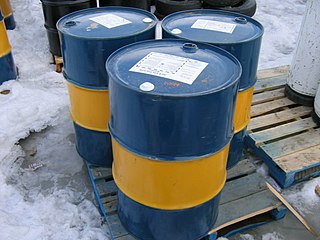
United Nations Security Council resolution 1284, adopted on 17 December 1999, after recalling previous relevant resolutions on Iraq, including resolutions 661 (1990), 687 (1991), 699 (1991), 707 (1991), 715 (1991), 986 (1995), 1051 (1996), 1153 (1998), 1175 (1998), 1242 (1999) and 1266 (1999), the council established the United Nations Monitoring, Verification and Inspection Commission (UNMOVIC) to replace the United Nations Special Commission (UNSCOM). It was the final resolution adopted in 1999.

United Nations Security Council resolution 986, adopted unanimously on 14 April 1995, after reaffirming all resolutions on Iraq and noting the serious humanitarian situation with the Iraqi civilian population, the council, acting under Chapter VII of the United Nations Charter, established a mechanism whereby Iraqi oil exports would finance humanitarian aid to the country, which later became known as the Oil-for-Food Programme.

United Nations Security Council resolution 1111, adopted unanimously on 4 June 1997, after recalling all previous resolutions on Iraq, including Resolution 986 (1995) which established the Oil-for-Food Programme, the council, acting under Chapter VII of the United Nations Charter, extended the provisions of that resolution relating to Iraqi oil sales for a further 180 days to meet the humanitarian needs of the Iraqi people.
United Nations Security Council resolution 1129, adopted on 12 September 1997, after recalling all previous resolutions on Iraq, including resolutions 986 (1995) and 1111 (1997) concerning the Oil-for-Food Programme, the Council decided that the provisions of Resolution 1111 would remain in force, but permitted special provisions to allow Iraq to sell petroleum in a more favourable time frame.

United Nations Security Council resolution 1143, adopted unanimously on 4 December 1997, after recalling all previous resolutions on Iraq, including resolutions 986 (1995), 1111 (1997) and 1129 (1997) concerning the Oil-for-Food Programme, the council, acting under Chapter VII of the United Nations Charter, extended provisions relating to Iraqi oil sales for a further 180 days to meet the humanitarian needs of the Iraqi people.

United Nations Security Council resolution 1158, adopted unanimously on 25 March 1998, after recalling all previous resolutions on Iraq, including resolutions 986 (1995), 1111 (1997), 1129 (1997), 1143 (1997) and 1153 (1998) concerning the Oil-for-Food Programme, the council, acting under Chapter VII of the United Nations Charter, authorised the sale of up to 1.4 billion United States dollars of Iraqi oil and oil products within a 90-day period, beginning from 5 March 1998.

United Nations Security Council resolution 1175, adopted unanimously on 19 June 1998, after recalling all previous resolutions on Iraq, including resolutions 986 (1995), 1111 (1997), 1129 (1997), 1143 (1997), 1153 (1998) and 1158 (1998) concerning the Oil-for-Food Programme, the Council noted that Iraq was unable to export petroleum or petroleum products sufficient to produce US$5.256 billion worth of oil and authorised countries to provide Iraq with equipment to allow it to meet that sum.

United Nations Security Council resolution 1210 was adopted unanimously on 24 November 1998, after recalling all previous resolutions on Iraq, including resolutions 986 (1995), 1111 (1997), 1129 (1997), 1143 (1997), 1153 (1998) and 1175 (1998) concerning the Oil-for-Food Programme. The Council extended provisions relating to the export of Iraqi petroleum or petroleum products sufficient to produce US$5.256 billion worth of oil for a further 180 days.

United Nations Security Council resolution 1242, adopted unanimously on 21 May 1999, after recalling all previous resolutions on Iraq, including resolutions 986 (1995), 1111 (1997), 1129 (1997), 1143 (1997), 1153 (1998), 1175 (1998) and 1210 (1998) concerning the Oil-for-Food Programme, the Council extended provisions relating to the export of Iraqi petroleum or petroleum products sufficient to produce up to US$5.256 billion worth of oil for a further 180 days.

United Nations Security Council resolution 1266, adopted unanimously on 4 October 1999, after recalling all previous resolutions on Iraq, including resolutions 986 (1995), 1111 (1997), 1129 (1997), 1143 (1997), 1153 (1998), 1175 (1998), 1210 (1998) and 1242 (1999) concerning the Oil-for-Food Programme, the Council increased the limit on the amount of oil Iraq could export to 3.04 billion United States dollars for the current 180-day period which began on 25 May 1999.

United Nations Security Council resolution 1280, adopted on 3 December 1999, after recalling resolutions 1242 (1999), 1266 (1999) and 1275 (1999) concerning the Oil-for-Food Programme, the council, acting under Chapter VII of the United Nations Charter, extended provisions relating to the export of Iraqi petroleum or petroleum products in return for humanitarian aid for one week until 11 December 1999.

United Nations Security Council resolution 1281, adopted unanimously on 10 December 1999, after recalling all previous resolutions on Iraq, including resolutions 986 (1995), 1111 (1997), 1129 (1997), 1143 (1997), 1153 (1998), 1175 (1998), 1210 (1998), 1242 (1999), 1266 (1999), 1275 (1999) and 1280 (1999) concerning the Oil-for-Food Programme, the council extended provisions relating to the export of Iraqi petroleum or petroleum products sufficient to produce up to US$5.256 billion worth of oil for a further 180 days.

United Nations Security Council resolution 1302, adopted unanimously on 8 June 2000, after recalling all previous resolutions on Iraq, including resolutions 986 (1995), 1111 (1997), 1129 (1997), 1143 (1997), 1153 (1998), 1175 (1998), 1210 (1998), 1242 (1999), 1266 (1999), 1275 (1999), 1280 (1999), 1281 (1999) and 1293 (2000) concerning the Oil-for-Food Programme, the Council extended provisions relating to the export of Iraqi petroleum or petroleum products in return for humanitarian aid for a further 180 days.

United Nations Security Council resolution 1330, adopted unanimously on 5 December 2000, after recalling all previous resolutions on Iraq, including resolutions 986 (1995), 1111 (1997), 1129 (1997), 1143 (1997), 1153 (1998), 1175 (1998), 1210 (1998), 1242 (1999), 1266 (1999), 1275 (1999), 1280 (1999), 1281 (1999), 1293 (2000) and 1302 (2000) concerning the Oil-for-Food Programme, the Council extended provisions relating to the export of Iraqi petroleum or petroleum products in return for humanitarian aid for a further 180 days.

United Nations Security Council resolution 1352, adopted unanimously on 1 June 2001, after recalling all previous resolutions on Iraq, including resolutions 986 (1995), 1284 (1999) and 1330 (2000) concerning the Oil-for-Food Programme, the Council extended provisions relating to the export of Iraqi petroleum or petroleum products in return for humanitarian aid until 3 July 2001.

United Nations Security Council resolution 1360, adopted unanimously on 3 July 2001, after recalling all previous resolutions on Iraq, including resolutions 986 (1995), 1284 (1999), 1330 (2000) and 1352 (2001) concerning the Oil-for-Food Programme, the Council extended provisions relating to the export of Iraqi petroleum or petroleum products in return for humanitarian aid for a further 150 days.

United Nations Security Council resolution 1382, adopted unanimously on 29 November 2001, after recalling all previous resolutions on Iraq, including resolutions 986 (1995), 1284 (1999), 1352 (2001) and 1360 (2001) concerning the Oil-for-Food Programme, the Council extended provisions relating to the export of Iraqi petroleum or petroleum products in return for humanitarian aid for a further 180 days.

United Nations Security Council resolution 1409, adopted unanimously on 14 May 2002, after recalling all previous resolutions on Iraq, including resolutions 986 (1995), 1284 (1999), 1352 (2001), 1360 (2001) and 1382 (2001) concerning the Oil-for-Food Programme, the Council extended provisions relating to the export of Iraqi petroleum or petroleum products in return for humanitarian aid for a further 180 days and approved a list of revised sanctions against the country. Its adoption streamlined the sanctions program, with restrictions on shipping civilian goods to Iraq lifted though prohibitions on weapons and military goods remained.

United Nations Security Council resolution 1443, adopted unanimously on 25 November 2002, after recalling all previous resolutions on Iraq, including resolutions 986 (1995), 1284 (1999), 1352 (2001), 1360 (2001), 1382 (2001) and 1409 (2002) concerning the Oil-for-Food Programme. The council, acting under Chapter VII of the United Nations Charter, extended provisions relating to the export of Iraqi petroleum or petroleum products in return for humanitarian aid until 4 December 2002.

United Nations Security Council resolution 1447, adopted unanimously on 4 December 2002, after recalling all previous resolutions on Iraq, including resolutions 986 (1995), 1284 (1999), 1352 (2001), 1360 (2001), 1382 (2001) and 1409 (2002) concerning the Oil-for-Food Programme, the council, acting under Chapter VII of the United Nations Charter, extended provisions relating to the export of Iraqi petroleum or petroleum products in return for humanitarian aid for an additional 180 days.
















